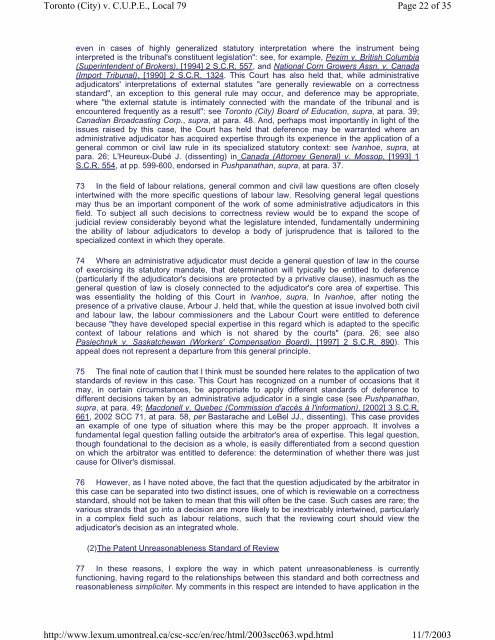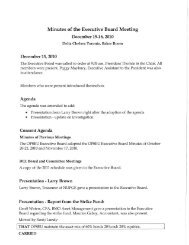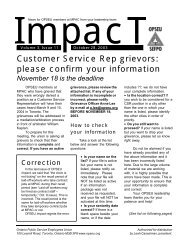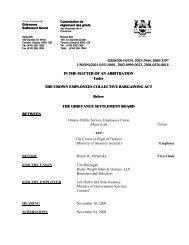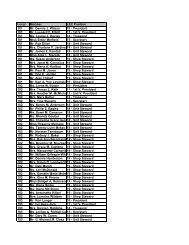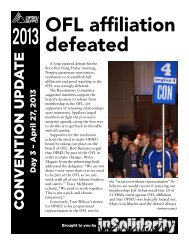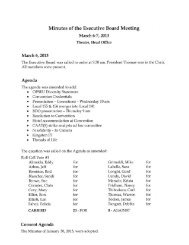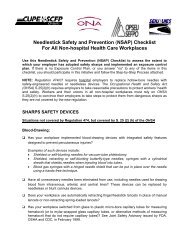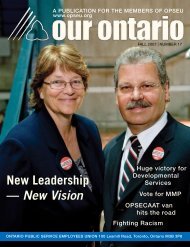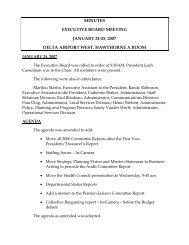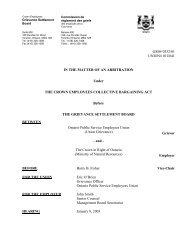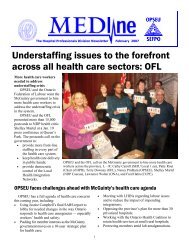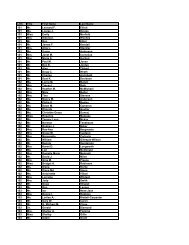C.U.P.E., Local 79 v. Toronto (City) .pdf - OPSEU
C.U.P.E., Local 79 v. Toronto (City) .pdf - OPSEU
C.U.P.E., Local 79 v. Toronto (City) .pdf - OPSEU
You also want an ePaper? Increase the reach of your titles
YUMPU automatically turns print PDFs into web optimized ePapers that Google loves.
<strong>Toronto</strong> (<strong>City</strong>) v. C.U.P.E., <strong>Local</strong> <strong>79</strong><br />
http://www.lexum.umontreal.ca/csc-scc/en/rec/html/2003scc063.wpd.html<br />
Page 22 of 35<br />
11/7/2003<br />
even in cases of highly generalized statutory interpretation where the instrument being<br />
interpreted is the tribunal's constituent legislation": see, for example, Pezim v. British Columbia<br />
(Superintendent of Brokers), [1994] 2 S.C.R. 557, and National Corn Growers Assn. v. Canada<br />
(Import Tribunal), [1990] 2 S.C.R. 1324. This Court has also held that, while administrative<br />
adjudicators' interpretations of external statutes "are generally reviewable on a correctness<br />
standard", an exception to this general rule may occur, and deference may be appropriate,<br />
where "the external statute is intimately connected with the mandate of the tribunal and is<br />
encountered frequently as a result": see <strong>Toronto</strong> (<strong>City</strong>) Board of Education, supra, at para. 39;<br />
Canadian Broadcasting Corp., supra, at para. 48. And, perhaps most importantly in light of the<br />
issues raised by this case, the Court has held that deference may be warranted where an<br />
administrative adjudicator has acquired expertise through its experience in the application of a<br />
general common or civil law rule in its specialized statutory context: see Ivanhoe, supra, at<br />
para. 26; L'Heureux-Dubé J. (dissenting) in Canada (Attorney General) v. Mossop, [1993] 1<br />
S.C.R. 554, at pp. 599-600, endorsed in Pushpanathan, supra, at para. 37.<br />
73 In the field of labour relations, general common and civil law questions are often closely<br />
intertwined with the more specific questions of labour law. Resolving general legal questions<br />
may thus be an important component of the work of some administrative adjudicators in this<br />
field. To subject all such decisions to correctness review would be to expand the scope of<br />
judicial review considerably beyond what the legislature intended, fundamentally undermining<br />
the ability of labour adjudicators to develop a body of jurisprudence that is tailored to the<br />
specialized context in which they operate.<br />
74 Where an administrative adjudicator must decide a general question of law in the course<br />
of exercising its statutory mandate, that determination will typically be entitled to deference<br />
(particularly if the adjudicator's decisions are protected by a privative clause), inasmuch as the<br />
general question of law is closely connected to the adjudicator's core area of expertise. This<br />
was essentiality the holding of this Court in Ivanhoe, supra. In Ivanhoe, after noting the<br />
presence of a privative clause, Arbour J. held that, while the question at issue involved both civil<br />
and labour law, the labour commissioners and the Labour Court were entitled to deference<br />
because "they have developed special expertise in this regard which is adapted to the specific<br />
context of labour relations and which is not shared by the courts" (para. 26; see also<br />
Pasiechnyk v. Saskatchewan (Workers' Compensation Board), [1997] 2 S.C.R. 890). This<br />
appeal does not represent a departure from this general principle.<br />
75 The final note of caution that I think must be sounded here relates to the application of two<br />
standards of review in this case. This Court has recognized on a number of occasions that it<br />
may, in certain circumstances, be appropriate to apply different standards of deference to<br />
different decisions taken by an administrative adjudicator in a single case (see Pushpanathan,<br />
supra, at para. 49; Macdonell v. Quebec (Commission d'accès à l'information), [2002] 3 S.C.R.<br />
661, 2002 SCC 71, at para. 58, per Bastarache and LeBel JJ., dissenting). This case provides<br />
an example of one type of situation where this may be the proper approach. It involves a<br />
fundamental legal question falling outside the arbitrator's area of expertise. This legal question,<br />
though foundational to the decision as a whole, is easily differentiated from a second question<br />
on which the arbitrator was entitled to deference: the determination of whether there was just<br />
cause for Oliver's dismissal.<br />
76 However, as I have noted above, the fact that the question adjudicated by the arbitrator in<br />
this case can be separated into two distinct issues, one of which is reviewable on a correctness<br />
standard, should not be taken to mean that this will often be the case. Such cases are rare; the<br />
various strands that go into a decision are more likely to be inextricably intertwined, particularly<br />
in a complex field such as labour relations, such that the reviewing court should view the<br />
adjudicator's decision as an integrated whole.<br />
(2)The Patent Unreasonableness Standard of Review<br />
77 In these reasons, I explore the way in which patent unreasonableness is currently<br />
functioning, having regard to the relationships between this standard and both correctness and<br />
reasonableness simpliciter. My comments in this respect are intended to have application in the


